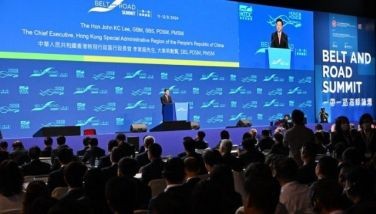Mending a broken society
That’s the title of a nice little book written by a priest-friend of mine, Fr. Henry Bocala. Yes, it’s little, as in less than 150 pages long, pocketbook size, but very substantive and well-packed with extensively researched materials and strongly reliable sources, spiced up by timely observations and witty commentaries by the author.
I would say it’s the relevant wisdom we need to have these days, and made available to us in bite-sized dosages.
For the man on the go, it can mean a very handy guide for cruising in our confusing times, enabling us to be more discerning and to read the signs of the times and effectively refute the clever logic of the world and of the flesh.
It’s said that we are now in a borderless society. That can mean a lot of things, both good and bad. It can be good in the sense that we are enriching ourselves with a great and increasing variety of elements.
What’s more, this variety is made easily accessible with our new technologies and a surge of technical interest and know-how among the people, especially the youth. We have to thank God for these wonderful developments in the world.
But our problem now is that many people consider everything that takes place as good, except when they are told by some authority, like the Church, what true good and bad really is. That one, they are certain, is what would constitute evil.
The power to discern good and evil now depends on one’s subjective perception of things. People are now averse to the idea of an objective and universal source of good and evil, and of an authority who is empowered not politically but spiritually and morally to teach and spread the relevant doctrine.
That’s one of the main reasons the book has that title. Our society is broken, though not everyone would admit it. And it’s broken, not only in terms of social relations, or in politics or economics, but more radically, in our spirit.
In fact, any talk of things spiritual would largely fall on deaf ears today.
Many people cannot make out what that means.
The sense of the spiritual is all but lost. And if it’s not lost, it’s twisted, as in many people succumbing to superstitions and other questionable forms of spiritualism including magic. Most of the time, people are just held captive by a carnal and worldly sense of things, insensitive to the spiritual and supernatural realities. Talk to them about faith, prayer, need for sacrifice, and they would most likely go blank. Talk to them about money, politics, fame, gossip, and they light up like sparklers. With this frame of mind, they can only have a fragmented view of things, and nothing global, not to mention, cosmic.
They rely more on feelings, on appearances, on social fads. Thinking metaphysical and theological is definitely out of place.
They prefer to follow more their instincts than their reason, and much less, their faith.
The subtitle of the book indicates where all the problems today can come from. “What happens when we forget who we are,” captures the very eye of the storm we are having. It’s when we forget we are children of God… People are losing the sense of divine filiation. In fact, sad to say, that expression sounds Greek to many of us.
The book has chapters on sex, the media, the hot-button issues of life, marriage and family, the world of work, the continuing socio-cultural wars waged in different parts of the world today, and the role of the youth.
It’s worth noting that the book approaches these questions in a wholistic way, putting faith and theology to whatever socio-economic and political analyses are made in them.
The author of course is highly qualified and competent to handle these matters. A writer and artist, he was first of all during his pre-priesthood days a political science graduate of UP Diliman, and had a stint in the staff of a senator for some years. I know him to be of an analytical mind, thoughtful and measured in his comments.
And as priest, he has a doctorate in canon law and has an extensive pastoral work with all sorts of people not only here in the Philippines but also in many places like Australia, Spain, Italy, South Africa and Israel.
This is his third book, the first being his doctoral thesis on canon law entitled, Diplomatic relations between the Holy See and Israel, and the second, a spiritual book entitled, Arise and walk. I highly recommend the book.
***
Email: [email protected]
- Latest























